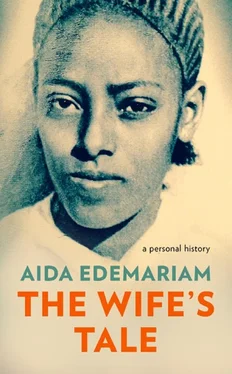The fourth day. ‘A cat and a mouse were getting married. On the day of the wedding the cat’s groomsmen gathered and together they made for the bride’s house, dancing and singing in anticipation of a feast. The mouse, like all brides, waited amongst her kinsfolk to be taken away to her new life. Then one of the other mice piped up – “You know, cats can’t be trusted. Let’s dig holes in the ground, just in case.” So they set to it, scrabbling out deep tunnels with hidden entrances. Finally the cats came into view, chanting “Ho – pick one up here, ho, pick one up there, ho.” When the mice saw them approaching they turned as one and plopped into their holes. And the cats, who thought they’d been so clever, didn’t catch a single mouse.’ His laugh wilted into the silence.
The fifth day. ‘Aleqa Gebrè-hanna, the famous wit – he was also leader of the church in which you were just married, did you know that? – was walking along the road when he met a donkey-driver. He greeted the peasant with unusual politeness for someone of his high status, even bowing low. In the mead-house later that evening the donkey-driver regaled his friends with his tale of a grand personage who had deigned to speak to him so kindly. But his friends were sharper than he was, and asked for the scholar’s precise words. “How are ye?” he repeated, realising, as he did so, that he had been included with his donkeys.’
She laughed. Her head tipped back, her veil slipped off, and for the first time she saw properly the man who had sat there all along. Pure white jodhpurs, wound tight around his calves. A wide sash around his waist. A cape of thick black wool falling from thin shoulders in generous folds. And under the white turban a small dark face and a tiny, straight nose. Awiy! she said in a low voice to the groomsman next to her. When I have children they’re going to look like that! He laughed, but she was serious. She dragged the material back over her face.
When, after nearly two weeks, the feasting was finally over, the little party left the bridal hut and walked into the das. It smelled of incense, of food and stale beer. The reeds and wildflowers that had been strewn across the ground were bruised and limp. Even under her netela she felt the expectant eyes; when it was lifted away so the guests could see her it was like a blinding.
AND HE TOOK THE MAIDEN TO HIMSELF, AND HE SAID UNTO HER, ‘BEHOLD, O MARY, I HAVE TAKEN THEE FROM THE HOUSE OF THE SANCTUARY OF GOD, BUT I WISH TO GO ON A JOURNEY. TAKE CARE OF THYSELF UNTIL I RETURN TO THEE, AND I WILL ASK THE LORD GOD TO PROTECT THEE AND BE WITH THEE.’
– LEGENDS
The tree was a green cave, full of shifting underwater light. And so quiet. She drew bare soles along the rough branch and resettled her spine against the trunk. In a minute she would climb down, hugging a bounty of peaches in the lap of her dress. But in a minute. First she wanted just to sit here, in the bird-sewn silence.
When, inevitably, she heard her name called, she didn’t answer. Maybe if she was really still – but the calls came closer, till they were beneath her feet. ‘Come down. Please come down?’ A pause. ‘You’re the wife of a big man now. You must come down.’
But he’s away , she replied fiercely, though only to herself. And I wish he’d never come back.
‘That’s right, careful.’ She shrugged away the proffered hand, and made for the house.
They were preparing for a visit from her father. Her aunt, Tirunesh, presided. Woizero Tirunesh, in her layers of white shawls, sitting stately, giving orders. Woizero Tirunesh, with her ever-present horn of dark beer, stirring up yet another domestic storm.
She was ambivalent about her father, Tirunesh’s younger brother. Mekonnen Yilma was proud, tall, a fast walker, a fast talker, a natural soldier. A good storyteller, too, and committed to witty conversation. Listening to the thrust and flash of his talk, his quick laughter and tight puns, or watching him settle himself onto a stool, take a sip of mead, then lean into his high ten-string lyre to sing slow low Lenten songs, she could almost forget she was afraid of him; almost forget the terror with which she watched him punish the other children, the spell of the thin hide whip curving through the air and kissing the backs of their legs.
Her father was proud, yes, but not too proud to beg. Over the years, from story after story – not all his – she had pieced together how she came to be. When Setechign – pale, beautiful, much-sought-after – first married Mekonnen the expected children did not arrive, so Tirunesh had taken herself off to church to have words with God about the situation. A boy was duly born, and named Nega, for the dawn.
Then Setechign left. No matter that Mekonnen was now a customs officer on the long lawless border with the Sudan. No matter that his immediate master was married to the empress’s sister. No matter that he regularly returned from military skirmishes laden with trophies and prisoners of war who often became valuable slaves, and that to this was added the tithes of the peasants who farmed his lands. Nor did it matter that – as Mekonnen, fond of genealogy (particularly his own) and possessed of a preternatural memory for names, made a point of reminding her – he could claim descent from at least three emperors and an empress, Taitu, and would thus give her offspring royal blood. No. His family was too big, there were too many hangers-on, it was all too much. So Setechign went.
He pleaded. He sent emissaries: his sister, his mother, elder after elder. They applied all the subtle pressures of home and hearth, and it took a couple of years, but eventually she returned, and they conceived a daughter.
In gratefulness Mekonnen plied his wife with gifts: trains of donkeys laden with wheat, barley, the whitest teff; pots of spiced butter, baskets of deep-red dried chillis, of cardamom, frankincense and rue.
Their daughter arrived the day before Christmas, on the feast of Ammanuel. There was no disagreement about what her baptismal name ought to be – Weletè Amanuel, daughter of Amanuel – but her daily name was another issue altogether. Her maternal grandmother favoured Genet, for the garden of Eden; her paternal grandmother Gedamenesh, or my sanctuary; while her mother called her Nigisté, my queen. Tirunesh and her father, however, chose Yetemegnu, or ‘those who believe’, and it was they who prevailed.
Again Setechign left. Distressed and in spiritual need she walked to Infiraz, where she had heard there was a great zar doctor. Perhaps he could heal her. But when she met him she was afraid. A huge, powerful man, he had once, when he was nineteen, crossed the high Simien on foot, scrambling down gorges and tramping over plains looking for his own mother, who had been abducted by a Tigréan lord. He found her, but could not release her, and on his way back had become possessed by a spirit that had never left him. He had learned instead to control it, and now his home was filled with incense and the smell of roasting coffee, with women speaking in tongues or stamping out their individual spirit dances; dancing, often, to his personal bidding too.
And this particular woman, with her tight-braided hair and neck so long it could take seven rings of tattoos – the zar doctor liked this particular woman. And the more Setechign fought him, the more she hated him, the more he liked her. She hated him so much that when she became pregnant with his child she tried to kill it, standing for hours under a waterfall in the hope of dislodging the growing thing. But it would not leave before it was ready and when it was born she called the boy ‘imbi alè’, or ‘he said no’. Not until he went away to school was his name changed, to Gebrè-Selassie.
Читать дальше












